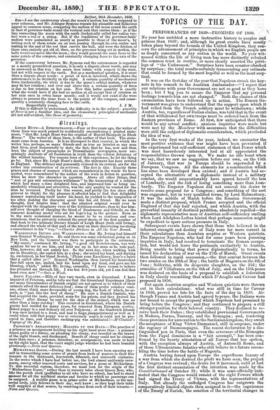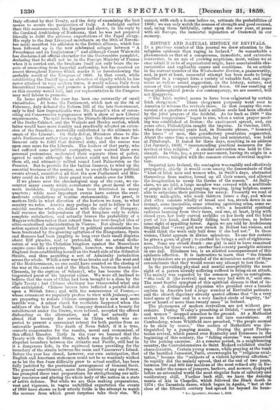TOPICS OF THE DAY.
PERFORMANCES OF 1859—PROMISES OF 1860. \‘' No year has unfolded a more instructive history to peoples aid. princes than 1859; and, although its great events have mostly — taken place beyond the bounds of the United Kingdom, they con- cern the advancement of principles in which we English people are as deeply concerned as any nation in the world. No year wit- nessed within the life of living man has more distinctly rebuked the common trust in routine, or more clearly asserted the privi- lege of "the Unforeseen." Surprises have been counter-checked by surprises ; the total results certainly transcending any estimate that could be formed by the most hopeful as well as the most scep- tical.
It was on the first day of the year that Napoleon struck the key- note in his remark to the Austrian Ambassador—" I regret that our relations with your Government are not so good as they have been ; but I beg you to assure the Emperor that my personal feelings towards him are not changed." Both the clauses of this enunciation have been followed up in action. The Roman Go- vernment was given to understand that the support upon which it had relied from the French soldiery must be withdrawn; while Austria, too, regardless of Italian claims, was told that in the event of that withdrawal her own troops must be ordered back from the Eastern provinces of Rome. At first, few anticipated that there would be any actual conflict; anxious inquiries were made but were met by the Moniteur with assurances that the difficulties were still the subject of diplomatic consideration, which precluded the idea of war.
In the very first weeks of the year, indeed, we encounter the most positive evidence that war might have been prevented if the experienced but self-sufficient statesmen of that Power which was most hazardously interested had at all appreciated the responsibilities thrown upon it. We make no idle boast when we say, that we saw no suggestion before our own, on the 15th of January, that war in Europe should be superseded by a European Congress. All the elements for a combination which has since been developed then existed ; and if Austria had ac- cepted the alternative of a diplomatic instead of a military combat, she would unquestionably have spared herself the loss of Lombardy, and the risk of losing something more than Lom- bardy. The Emperor Napoleon did not conceal his desire to receive some proposal for a Congress; and something of the sort was suggested, but in very qualified terms, by Lord Malmesbury. It was the middle of March before the Russian Government made a distinct proposal, which France accepted and the official England Of that day half rejected, and which Austria, with the proverbial insanity of destined perdition absolutely repelled—the diplomatic representative man of Austrian self-sufficiency smiling when Lord Adolphus Loftus hinted that perhaps concession might be expedient to spare serious pressure in Italy. Subsequent events have shown that those who believed in the inherent strength and destiny of Italy were far more correct in their calculations than Austrian sceptics or Western quietists. The Emperor Napoleon, who had for some years been pursuing inquiries in Italy, had resolved to terminate the Roman occupa- tion, but would not leave the peninsula exclusively to Austria. Being unable to bring that power diplomatically to terms, he issued his declaration of war on the 27th of March. Great events then followed in rapid succession —the first combat between the two armies on the 20th of May; the battle of Magenta on the 4th of June ; Solferino with its desperate slaughter, on the 23d; the armistice of Viliafranca on the 8th of July, and on the 11th peace was declared on the basis of a proposal to establish a federation in Italy closely resembling that which D'Azeglio and Cavour had proposed in 1856. But again Austrian sceptics and Western quietists were thrown out in their calculations: what was still in time for Cavonr in 1856, proved too late for the facts of the day in 1859. Al- though France and Austria had agreed to peace, the Italians were not bound to accept the proposal which Napoleon had promised to bring before the Congress; and they continued to prepare a still stronger position for their beloved country. They declined to re- ceive back their Dukes ; they established provisional Governments in Modena, Parma, Tuscany, and the Romagna - and, tendering those provinces for annexation to the Sardinianki4dom, they await the acceptance of King Victor Emmanuel, still in suspense, under the regency of Buoncompagni. The recent declaration by a dis- tinguished pen in Paris, that even the severance of the Romagna from the Papal dominions is a "fait accompli," has been con- firmed by the hearty attestation of all Europe that has spoken,
with the exception always of Austria' of intonelli Rome, and of those Ultramontane fanatics who still believe in a future resem- bling the time before the battle of Magenta.
Austria having forced upon Europe the superfluous luxury of a war from which she derived the profit we have seen, the project of a Congress was revived; the desire for it increased, until at last
the first distinct enunciation of the intention was made by the Constitutionnel of October 28; while it was semi-officially- inti-
mated that the Congress would consist of the eight Powers which had signed the Treaty of Vienna, with the representatives of Italy. But already the unfledged Congress has outgrown the comparatively limited objects then assigned to it—the cognizance of the Treaty of Zurich, the sanction of the territorial changes in Italy effected by that Treaty, and the duty of examining the best means to secure the pacitioation of Italy. A fortnight earlier than this announcement, the Emperor had_shown, in his reply to the Cardinal Archbishop of Bordeaux, that he was not prepared literally to fulfil the extreme expectations of the Papal clergy.
His reply to the four Liverpool merchants on the 30th of Novem- ber made manifest his adhesion to the British alliance, which has been followed up in the now celebrated eclogue between "A Frenchman and an Englishman ; " and although Count Walewsk-i has disclaimed all official character for the Gueronniere pamphlet,
declaring that he shall not be in the Foreign Ministry of France when it is carried out, the brochure itself not only bears the re- pute of emanating from Imperial authorship, but has received an assent throughout Europe which marks it as foreshadowing the probable result of the Congress of 1860.. In that event, while establishing the Pontiff upon an elevation of dignity which he has never attained in very modern times, it would release Italy from hierarchical trammels, and promote a political organization such as this country would hail, and our representative in the Congress may well labour to promote. In home politics the year has been one outwardly of small vicissitudes. At home the Parliament, which met on the 3d of February, duly debated the Reform Bill of the late Government, only to find how impracticable was Mr. Disraeli's idea of recon- eiling old Conservative repu„onances with a show of new Liberal requirements. The split between the Disraeli-Malmesbury section of the Derby Cabinet, and the Walpole and Henley section, which latter would have more frankly and practically adopted an exten- sion of the franchise, materially contributed to the ultimate tri- umph of the Liberals.- On their defeat, Ministers chose to dis- solve Parliament rather than resign ; but they met the new Par- liament only to fulfil that deferred duty, and the course was open once more for the Liberals. The leaders of that party, who had suffered some political castigation, now waived their own personal pretensions, moderated their separate ideas of policy, agreed to unite although the Cabinet could not find places for them all, and ultimately rallied round Lord Palmerston as the Premier. But to provide for the Indian finances, to wind up the essential business of the session, and to await the larger political events abroad, constituted all that the new Parliament and Min- istry could do in l89; their grand work stands over for 1860.
If we glance over the chronological map of the year • we en- counter many events which corroborate the great moral of the main incidents. Expectation has been frustrated in . many quarters ; while most important events have outrun the over- moderate calculations of routine statesmanship. For proof, it matters little in what direction of the horizon we turn, to what country we refer. Austria may perhaps be said to follow in her suicidal routine when she dallies with the claims of Hungary, half restores the independence of that kingdom only to refuse complete satisfaction, and actually braves the probability of a Magyar rebellion rather than retract from her new-fangled idea of ultra-centralised administration in Vienna. But already the re- action against this arrogant belief in political predestination has been frustrated by the growing agitation of the Hungarians. Spain and Morocco had been jangling so long over their small disputes about Riff piracies, real or pretended, that an actual decla- ration of war by the Christian kingdom against the Mussnlman empire came like a surprise. Spain, however, was debarred by England from establishing herself on the South side of the Gibraltar Straits, and thus acquiring a sort of Admiralty jurisdiction across the whole. While a new war thus breaks out at the west end of the Mediterranean, no one could have counted on the closing of the war at the eastern end of the Black Sea' between Russia and Circassia by the capture of Schamyl, who has become the dis- tinguished guest of his imperial victor. We were all inclined to believe that the wars of China had been brought to a close by the Elgin Treaty ; but Chinese obstinacy has transcended what any ofns anticipated. Chinese braves have inflicted a painful defeat upon a British force ; and with the concurrence of France,— whose armament we popularly profess to view with jealousy,—we are preparing to reduce Chinese arrogance by a new and more terrible war. A minor check for routinists -happened when the soldiers of the late East India Company demanded a bounty for reenlistment under the Crown were refused, accepted the offered disbanding as the alternative, and at last actually de- clined that bounty for service in China which was ex- pected to present a convenient retreat for both parties from an untenable position. The death of Nena Sahib, if it is true, scarcely compensates for the results, moral and economical, of this official blunder. Early in the year we learned that the Treaty with the United States, which was finally to settle the disputed boundary between the Atlantic and Pacific still had in it a dangerous hole, in the equivocal terms providing for the boundary of the straits between the main and Vancouver's Island. Before the year has closed, however, our own anticipation, that English and American statesmen could not be so wantonly wicked as to let the San Juan difficulty grow to actual conflict, has been fully justified by the provisional arrangement of General Scott. The general unsettlement, more than jealousy of any one Power, has prompted those vast preparations for strengthening our mili- tary resources and placing the whole body of the nation in a state
e- of active defence. But while we are thus making preparations, vast and vigorous, in vague unfulfilled expectation the events of 1859 have shown us how utterly futile is the attempt to watch the sources from which great surprises take their rise. We cannot, with such a lesson before us, estimate the probabilities of 1860; we can only watch the sources of strength and good counsel, and, using them faithfully, enter upou the new year, at peace with all Europe, the immortal injunction of Cromwell in our memory.



























 Previous page
Previous page